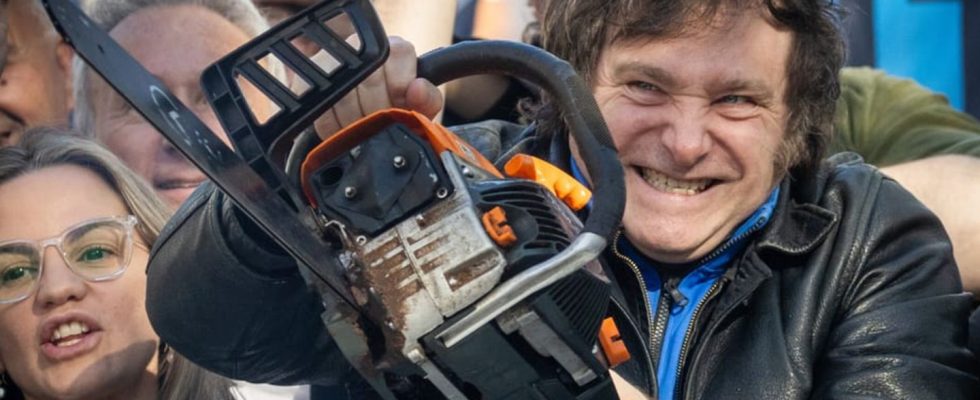Market radical and authoritarian
Milei gets serious: Argentina’s new president uses the chainsaw
Javier Milei during an election campaign appearance with a chainsaw: Argentina’s new president wants to radically restructure the state.
© Thomas Cuesta/Getty Images
Arriving in office first? Are you kidding me? Are you serious when you say that. Argentina’s new president is starting as radically as he talked about during the election campaign. Critics fear for democracy under Javier Milei.
Javier Milei’s first official actions don’t really come as a surprise. Cast with a chainsaw in his hand Argentina’s new president in the election campaign to cut social spending and radically restructure the state. Even many of his followers may have considered the self-proclaimed “anarcho-capitalist”‘s plans to be mere hype. But less than two weeks after taking office it became clear: the right-wing populist economic liberal is serious about his announced “shock therapy.”
In the first days after coming to power, Milei’s government devalued the peso by half, thereby increasing the cost of living for Argentina’s 46 million people by half in one fell swoop. At the same time, subsidies for energy and transport were cut and state construction contracts were stopped – these measures also primarily affect wage-earning employees. In addition, all state employees who have been employed for less than a year should be laid off. Economy Minister Luis Caputo justified the cuts with the “addiction” to state money and corruption in the country.
In fact, Argentina has long been suffering from an economic crisis and the fourth highest inflation in the world. This year alone, prices have risen by 160 percent, and according to the central bank, the inflation rate is expected to rise to 185 percent by the end of the year. At the same time, the gross domestic product is shrinking massively. TueThe radical devaluation of the national currency and the new government’s austerity measures are further aggravating the situation, especially for the 40 percent of the population who already live below the poverty line.
Tough course against demonstrators
So far there have been no major protests against the new government’s austerity policies. But Milei has also prepared for this case. In a presidential decree at the beginning of the week, his Interior Minister Patricia Bullrich announced tough action against demonstrators: the police should break up road blockades with all severity. Anyone who organizes protests should also be able to be prosecuted under environmental law, for example for burning garbage cans. Foreigners who take part in protests face deportation. The government also wants to create a list of all organizations that call for demonstrations. People who take children and young people to protests are threatened with sanctions by the youth welfare office. But Milei’s move towards authoritarianism can be seen elsewhere.
Women’s rights
“We look violence in the face every day” – eight women about their fight against oppression
As announced during the election campaign, the new president has halved the number of his ministries from 18 to nine. Significantly, he abolished the ministries of education, culture, labor and social development. The former Ministry for Women, Gender and Diversity is now subordinate to a newly created Ministry for Human Capital – this term also refers to Milei’s ultra-liberal economic thinking. But even more than the dismantling of the welfare state, Milei’s critics fear his stance on the military dictatorship, which ended exactly 40 years ago with the return to democracy.
How does he feel about military dictatorship?
The right-wing military junta that ruled Argentina from 1976 to 1983 murdered around 30,000 people. Coming to terms with these crimes still shapes Argentine society today; many perpetrators were sentenced to long prison sentences. But in recent years those forces that justify torture, murder and the “disappearance” of political opponents by the military and demand an end to legal persecution have also become stronger. It seems clear which side Milei is on.
Before the anniversary of the end of the dictatorship on Sunday, an appeal committee HOracio Losito and Julio Rafael Barreiroreleased from custody. The two ex-military men were sentenced to long prison terms for crimes against humanity. It is not certain whether the new government had a direct influence on the decision.
The main thing is that Milei’s dogs are doing well
What is certain, however, is that Milei’s vice president, Victoria Villarruel, is a supporter of the military dictatorship. Her father fought alongside Horacio Losito in the 1982 Falklands War against Great Britain. After his release from prison, a recording emerged of Losito exclaiming: “Long live freedom, damn it!” – one of Javier Milei’s election slogans. The right-wing legal association “Justice and Unity” also celebrated Losito’s release on X:
But while Javier Milei warns his compatriots that times will be hard and argues with empty coffers, it’s his four dogs Murray, Milton, Robert and Lucas – named after representatives of liberal economic theory – lack nothing. As the Argentine newspaper “Clarín” reports, the English Mastiffs are to move into an annex on the grounds of the Quinta de Olivos presidential palace in Buenos Aires. However, Milei first has the “dog house” converted and air-conditioned – for the equivalent of almost 109,000 euros at the expense of the state treasury.
Sources: News agencies dpa/AFP/Reuters / Tweet from Patricia Bullrich / Report on pagena12.com / Report on clarin.com


